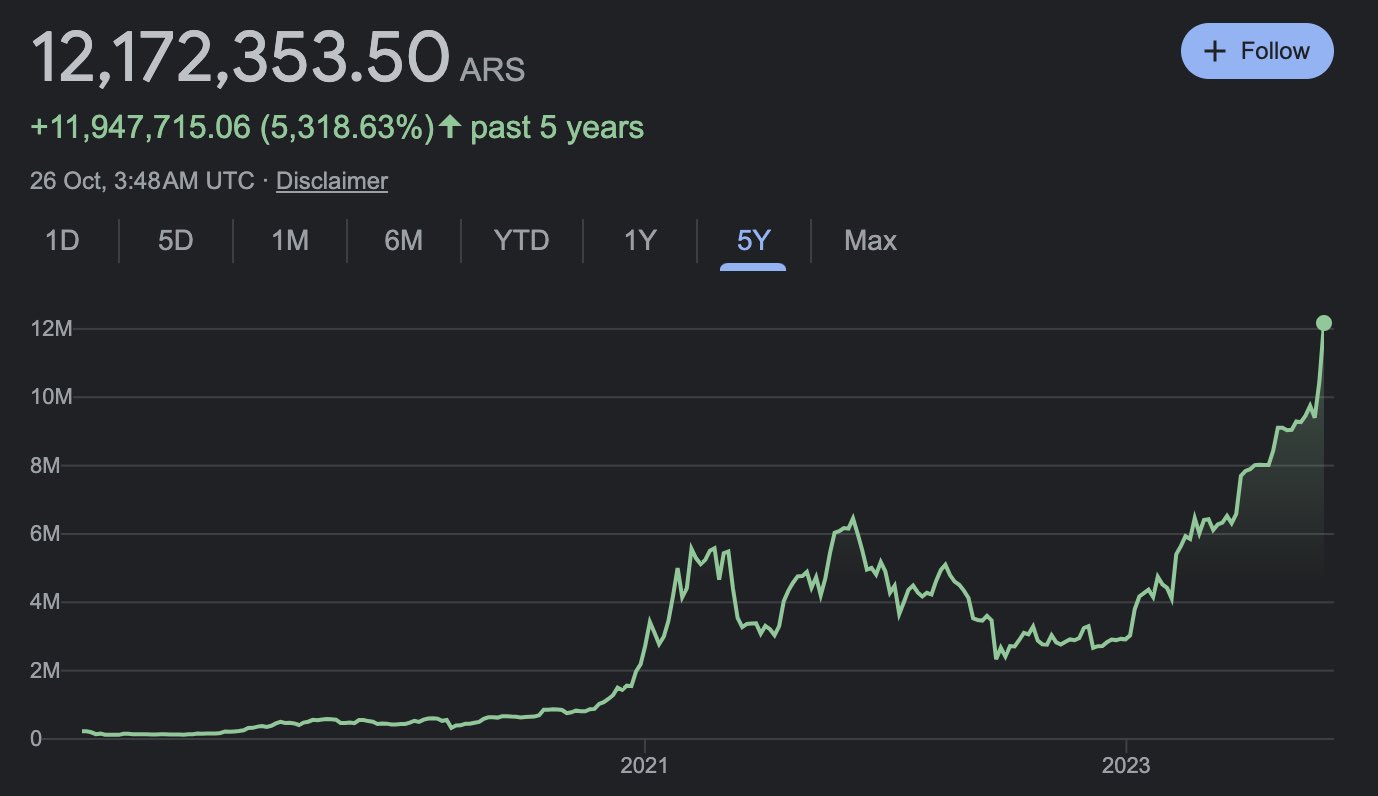How Bitcoin is soaring against some of the world’s most devalued currencies
Bitcoin has hit a new all-time high (ATH) in terms of the local currencies in at least three countries: Argentina, Turkey, and Nigeria. This means that one bitcoin is worth more in these countries than ever before. Bitcoin, the leading cryptocurrency, has been on a rally in recent weeks, reaching new highs against the U.S. dollar and other major currencies. But for some countries that are facing severe inflation and currency devaluation, Bitcoin’s value has skyrocketed even more.

Bitcoin vs. high-inflation currencies
According to onchain data, Bitcoin’s price has increased by about 30% in the past few weeks, from around $26,500 to over $35,000 as of Oct. 25, 2023. However, this increase is dwarfed by the gains that Bitcoin has made against some of the world’s most inflationary fiat currencies.
For example, as of Oct. 26, 2023, one Bitcoin was worth about 12.17 million Argentine pesos (ARS), 979,017 Turkish liras (TRY), and 28.44 million Nigerian nairas (NGN). These are all new all-time highs for Bitcoin against these currencies, surpassing the previous records set in early 2021.
As you can see, Bitcoin’s price has increased exponentially against these currencies, while remaining relatively stable against the U.S. dollar. This means that for people living in these countries, Bitcoin has become a much more valuable asset and a potential hedge against inflation and currency devaluation.
Some of the factors that may contribute to this phenomenon are:
- The weakening of the local currency due to economic crisis, political turmoil, sanctions, or hyperinflation. For example, Venezuela has been experiencing a severe economic collapse and a record-breaking inflation rate of over 10,000%.
- The increasing demand for bitcoin as a store of value, a hedge against inflation, or a means of remittance. For example, Argentina has imposed strict capital controls and limits on foreign currency purchases to prevent capital flight and preserve its dwindling reserves.
- The growing adoption and innovation of bitcoin and other cryptocurrencies in these countries. For example, Turkey has a vibrant crypto ecosystem with several exchanges, startups, and communities that offer various services and solutions for crypto users.
These are some of the reasons why bitcoin is hitting ATHs in many countries. However, bitcoin is also volatile and risky, so it is important to do your own research and be careful before investing or using it.
Why are these currencies losing value?
The main reason behind the loss of value of these currencies is inflation, which is the general increase in the prices of goods and services over time. Inflation reduces the purchasing power of money, meaning that people need more money to buy the same things.
According to the International Monetary Fund (IMF), Argentina had an annual inflation rate of 122% in 2022, making it the fourth-highest in the world after Venezuela, Zimbabwe, and Sudan. Nigeria had an inflation rate of 25%, ranking 15th in the world. Turkey had an inflation rate of 51%, ranking sixth in the world.
These high inflation rates are caused by various factors, such as government policies, fiscal and monetary interventions, interest rate changes, and external shocks. For example, Argentina has been struggling with a long-standing debt crisis and political instability, which have eroded investor confidence and triggered capital flight. Nigeria has been hit by low oil prices and security challenges, which have affected its economic growth and foreign exchange reserves. Turkey has faced geopolitical tensions and currency interventions, which have weakened its monetary policy credibility and increased its vulnerability to external shocks.
How are people using Bitcoin in these countries?
Given the high inflation and currency devaluation in these countries, it is not surprising that many people have turned to Bitcoin and other cryptocurrencies as alternative forms of money and store of value. According to a report by Chainalysis, Nigeria, Turkey, and Argentina were among the top 15 countries in terms of cryptocurrency adoption in 2022.
Cryptocurrencies offer several advantages over fiat currencies in these contexts. They are decentralized and independent from government control and interference. They are global and borderless, allowing people to access international markets and remittances. They are transparent and verifiable, enabling people to avoid fraud and corruption. They are also scarce and deflationary, meaning that their supply is limited and their value tends to increase over time.
However, cryptocurrencies also face several challenges and risks in these countries. They are volatile and unpredictable, exposing people to market fluctuations and price swings. They are subject to regulatory uncertainty and restrictions, as some governments have banned or limited their use or imposed taxes or fees on them. They are also dependent on internet access and infrastructure, which may not be reliable or affordable for everyone.
What does this mean for the future of Bitcoin and global finance?
The rise of Bitcoin against some of the world’s most devalued currencies shows that cryptocurrencies have a significant role to play in the global financial system. They offer an alternative way of storing and transferring value that is more accessible, inclusive, and resilient than traditional fiat currencies.
However, cryptocurrencies also pose challenges and opportunities for governments, central banks, regulators, and financial institutions. They may need to adapt their policies and practices to accommodate the growing demand and use of cryptocurrencies, while also ensuring their stability, security, and legality. They may also need to explore the potential of developing their own digital currencies, such as central bank digital currencies (CBDCs), which could combine the benefits of cryptocurrencies with the advantages of fiat currencies.
The future of Bitcoin and global finance is likely to be shaped by the interaction and innovation of these different actors and forces. As more people and countries adopt and use cryptocurrencies, they may create new possibilities and realities for the global economy and society.
